By Nicole Saldarriaga
If you think the Sirens are the only mythological beings capable of making music deadly, think again. Mythology gives us another, much older trio of ladies whose song was meant to torture and kill their victims. They go by many names, but at least one is eminently recognizable: they are often called the Furies.
According to most mythological accounts, the three Furies—named Alecto (the unceasing), Megaera (the jealous), and Tisiphone (the avenger)—were literally born of blood. They sprang into being after the Titan, Kronos, castrated his father, Uranus. The blood from Uranus’ wound fell to the earth (Gaia) and produced the Giants, the Furies (or Erinyes), and the Meliae (a kind of nymph).
This bloody backstory is particularly important to the Furies for two reasons.
First, it establishes their age and lineage—they are older even than the Olympians, and are the direct result of a co-mingling of two primeval forces (Uranus, the heavens, and Gaia, the earth). Second, they are also the result of a crime committed by a son against his father. Fittingly, then, for many years the Furies were considered avengers of violations to the natural order—if a man killed his parents, for example, he could expect to answer to the Furies.
By all accounts, the Furies were visually terrifying. They had the bodies and faces of twisted old women, with writhing snakes for hair, runny eyes, and tattered black clothing. They punished their victims with a wild paralytic song that aroused intense feelings of guilt and remorse—essentially, the Furies drove criminals mad by exposing them to their own guilt and fear.
The Furies were, for all intents and purposes, monsters. They may have been monsters seeking justice, but they were terrifying monsters nonetheless.
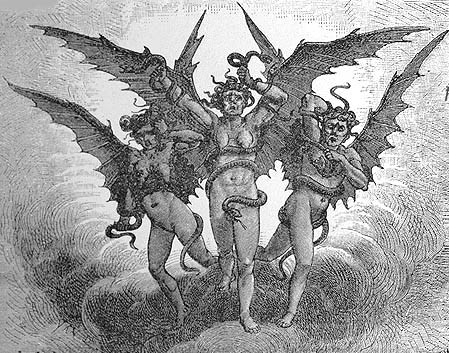 The Furies
The FuriesAnd yet, believe it or not, they were worshipped in Athens. They had their own sanctuary and sacred grotto, and were called the “Eumenides,” meaning “the kindly ones.”
Okay—what gives?
One of the best sources to look to when trying to understand Athens’ worship of the Eumenides is actually a trilogy of plays called The Oresteia, by an Ancient Greek tragedian named Aeschylus (c. 525-456 BCE). In these plays he not only tells the tragic story of Agamemnon, Clytemnestra, and Orestes, but also essentially gives us an origin story for Athens’ famous trial-by-jury system of justice.
It’s in the last play of this trilogy, called The Eumenides, that we can see a distinct shift in the function and identity of the Furies. But before we can understand how they went from being the Erinyes (“the angry ones”) to being the Eumenides (“the kindly ones”), we have to understand why they make an appearance in the trilogy in the first place.
According to legend, Agamemnon, the commander of the Greek army in the Trojan War, was brother to Menelaus, whose wife, Helen, was taken by Paris (a crime against hospitality that started the war to begin with). Before the Greek army can set sail for Troy, Agamemnon and Menelaus are told that they must sacrifice Agamemnon’s daughter, Iphigenia, to appease the goddess Artemis—otherwise they will be unable to sail.
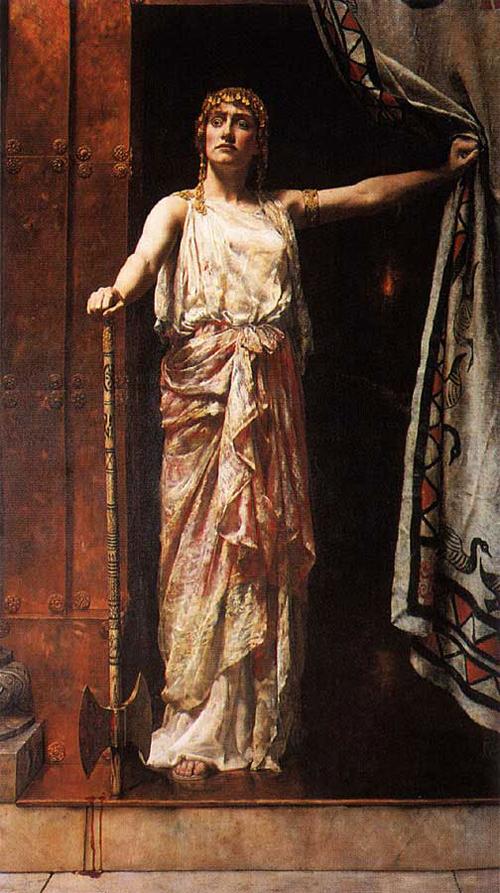 Clytemnestra after the murder, by John Collier
Clytemnestra after the murder, by John CollierTo make a long story very, very short, Agamemnon ritually kills Iphigenia, devastating his wife, Clytemnestra, who, upon Agamemnon’s return from the long war, murders him in his bath. Orestes, their son, who was away from home at the time of his father’s murder, eventually returns home and avenges his father’s death by murdering Clytemnestra and her lover.
This, clearly, is where the Furies come in. Their purpose is to punish violations of the natural order, such as Orestes’ killing of his own mother, and they get to work almost immediately. Circumstances matter very little to them—it doesn’t matter that Clytemnestra killed her husband first, Orestes must still be punished for killing his mother (a much stronger blood tie than husband and wife). By the end of the play in which Clytemnestra’s murder takes place, The Libation Bearers, Orestes is tormented by “ghastly women, like Gorgons,/ with dark raiment and thick-clustered snakes/ for tresses” (1048-49). He runs offstage, screaming about their terrifying appearances.
Apollo (who encouraged Orestes to commit the murder in the first place, but the Furies care little about this detail) tells Orestes to travel to the sanctuary of Athena, where he must embrace her idol and beg for assistance.
Once Athena responds to Orestes’ plea and enters the action, she pulls together Athens’ first jury trial in order to decide once and for all whether Orestes deserves punishment for his actions, or whether he acted in the right.
This is a fascinating section of the play which normally deserves a great deal of attention, but for now we are focusing on the Furies. So, to make a long story short (again), the jury of Athenian men finds Orestes “innocent” in the sense that his actions were justified. The Furies are, of course, extremely unhappy with this answer, and Athena has to do some damage control. She asks the Furies to stay in Athens—and she asks them no fewer than four times (sweetening the deal each time) before the terrifying trio decides to stay.
If the Furies represent such a pernicious form of torment, why is Athena so desperate to have them stay in Athens? On the one hand, she must protect her city from the threat of the Furies, who specifically proclaim that if Orestes is freed, they will spread venom throughout the land: “a canker, blasting leaves and children…speeding over the ground/ shall cast upon the land infections that destroy its people” (785-787).
Although it seems that banishing the Furies before they have a chance to curse the land is the obvious solution, the text actually implies that the Furies’ curse would come about as a result of their permanently leaving the land.
The Erinyes, after all, are in many ways a personification of righteous guilt. If guilt were to leave Athens forever, the city would be destroyed. This is why the Furies mention children in their threat—human beings who feel no guilt or shame could do any number of horrible things to each other without having to fear the internal torment of remorse. In a world like that, it would be difficult to trust anyone, and without absolute trust there can be no love or marriage, without which there would be no children. The Furies, by abandoning Athens, would devastate the family, and without family there can be no Polis. Athena cannot let this happen to her city.
After all, she recognizes that guilt and fear are absolutely essential to the health of civilization. Even if a lack of guilt didn’t pose a serious threat to families, it could still destroy civilized society from the inside out, resulting in absolute anarchy. How could Athena’s newly implemented trial-by-jury legal system be sustained in such a place? “And what city,” say the Furies, “or what man/ that in the light of the heart/ fostered no dread could have the same/ reverence for Justice?” (522-525). Fear and guilt are absolutely essential to the formation of the Athenian legal system, and this is why Athena tells her people that “they shall not cast out altogether from the city what is to be feared/ For who among mortals that fears nothing is just?” (698-699).
There is simply no Justice without the Furies.
But of course, the Furies are not exactly happy with Athena—convincing them to stay is not going to be easy—and in order to make them forget their anger, Athena must “sweeten the pot” pretty heavily; but to do this, interestingly enough, she has to fundamentally change the Furies’ role in society.
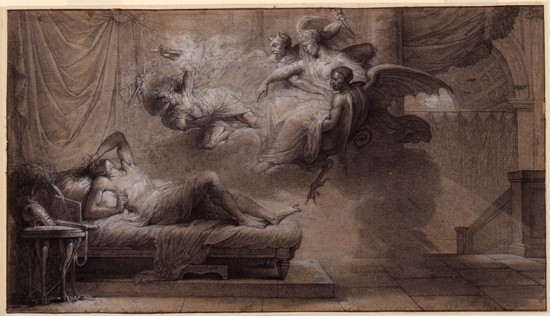 Orestes pursued by the Furies, by Louis Lafitte
Orestes pursued by the Furies, by Louis LafitteTo please the Furies, Athena offers them a legally recognized home in Athens, tells them that they will be worshipped after every marriage and childbirth, and that they will also have the power to bring fortune to Athens by controlling the earth, sea, and sky (essentially they will have power over the weather).
These tasks are clearly not what the Furies are used to—and, after all, they are very passionate about bringing evildoers to Justice—why should they accept a new set of duties? Because, in essence, their new roles would still make them fundamentally important to the carrying out of Justice.
As representations of unrelenting guilt, the Furies could never have taken part in Athens’ legal system. The constant presence of unrelenting, overwhelming guilt would paralyze a jury, making it impossible for them to make a decision (for fear of making the wrong one). When Athena gives the Furies power over the weather and over childbirth—things that are fundamentally natural—she instead makes them representations of everything that humans and politics cannot control. By constantly pointing to the forces of nature, the Furies would remind humans that they are limited and imperfect.
This is absolutely crucial to an effective legal system. As a reminder of human limitation and imperfection, the Furies can act as a release from the paralyzing guilt that might make a jury incapable of functioning. A juror who recognizes that he is only human and that he might make a mistake is not overwhelmed by that possibility and is thus able to make a decision. It is a principle that emphasizes the necessity of a decision—of a legal system—over the repercussions of occasionally “getting it wrong.” The Furies are thus transformed into the Eumenides–from fury to “good anger,” from forces of vengeance to forces absolutely necessary to the carrying out of justice.
According to Aeschylus, it’s for this reason that the Furies received their new name and were subsequently worshipped in Athens with an extreme amount of reverence (and more than a little righteous fear). Thanks to Athena’s clever thinking, a trio of horrifying monsters whose only purpose was to torture their victims became a trio of worshipped goddesses who worked together with the Polis to ensure the health of a groundbreaking legal system—a legal system that still lives on in many forms today.
Clearly, the Eumenides have been doing a good job.

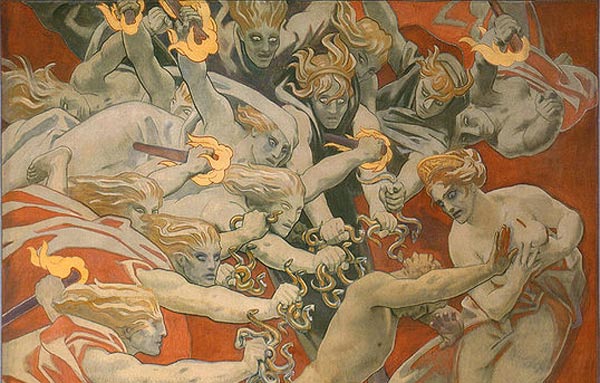
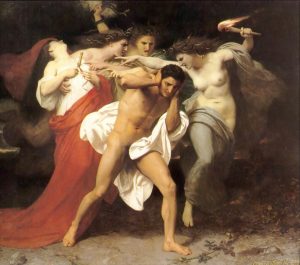








One comment
Very interesting and instructive.
Trackbacks
Our apologies, you must be logged in to post a comment.